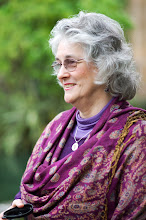 |
| San Quentin State Prison, Marin County, California |
This year's theme was Social Justice.
Saturday, January 24, late afternoon session:
Journalist Marsha
Scarbrough, in a talk called “Calling
on the Orishas to Heal Racial Injustice,” spoke of the African teachings
she received and the ritual work they did with the Orishas.
Herleena Hunt, “The
Social Injustice of Mass Incarceration of People of Color: Can This Be Changed?” Herleena, an employee of the Amity
Foundation which serves in five California state prisons using the
Therapeutic Community (TC) model, works directly with inmates within the prison
system, assisting them with acquiring a GED, counseling, and reintegration into
society as productive people.
Unlike Herleena, those of us who volunteer with religious
communities within the California Department of Corrections and Rehabilitation
(DOCR), as I do with the Witchen circle at San Quentin, are prohibited from
having personal relationships with inmates, or in fact knowing anything about
their personal lives or the convictions that resulted in their
incarceration. Nor are inmates
permitted to know anything personal about us volunteers. I tried to explain the opacity of
prison administration in my talk called “Into
the Labyrinth: Finding the Way as a Volunteer in Abstruse Prison Culture.” For those who’d like more information,
I’ve written six blogs about that work beginning here.
People tend to “find religion” after they been imprisoned, not necessarily before they
entered. Few are from Pagan backgrounds. They explore Pagan paths in
prison. Now, due to recent federal
court orders to alleviate overcrowding in the prisons, more people are being
released. The important thing to
look at is how these people are integrated into Pagan society when they found a
Pagan path on the inside.
I had prepared a decent PowerPoint and had notes about what
I wanted to say, but in the event I just winged it and talked. The entire late afternoon session of
three presentations generated plenty of discussion, which I anticipate will
continue online and at conferences and elsewhere in terraspace.
Sunday, January 25
Hannah Epstein opened with “Pagan Clergy and Unpaid Emotional Labor.” I’m sure that all of those who run groups, circles, and
covens, as well as those of us who volunteer in our communities on behalf of
Pagans in interfaith and secular contexts, can sympathize.
Ayamanatara’s
presentation was called “Synthesizing
the Dark Goddess and the God of Light on the Internet to Effect Social Justice.” She spoke about technical stuff that
was beyond me; however, she did suggest some remedies for too much involvement
in online communications and too much time screen-gazing.
Lilith Nightsong’s talk was not listed in the program and
I’ve forgotten the title. However,
she introduced those of who are older and/or technologically challenged to
several terms and related internet phenomena which we’d be well advised to
learn better.
Kimberly D. Kirner, who usually presents more scholarly
offerings, this year spoke of her cross-identity as a Druid in service of
justice in “Art, Study, and Service:
Being a Druid and an Anthropologist Working for Justice.” In particular, she offered a Druid
prayer, evidently one commonly used, that I want to take to the San Quentin
circle.
Mark Cedar Love-Williamson, in his talk called “The Activist Witch; the Virtuous Witch,”
spoke about moral foundations theory, citing a book called The Righteous Mind: Why Good People are Divided by Politics and Religion,
by Jonathan Haidt. He claimed
morality is not rational, but rather it is intuitive. He referenced LOHAS
(Lifestyles of Health and Sustainability), “a market segment focused on health
and fitness, the environment, personal development, sustainable living, and
social justice.” Mark said that
moral elevation is when you see a good deed. He cited a website called YourMorals.org. I surfed around this site and registered on it. I found it interesting enough to plan
to return and explore it further.
I suggest that you who read this might also find a visit to
YourMorals.org a worthwhile investment of your time.
Mark continued with a list of Pagans whom he considered “virtuous
activists.” At least one person
present who knows me well noticed that I had become agitated. I will say a few things about that.
One is that when you’ve been around a while, you develop
histories and you know people for more than just their public persona. Such is the case with me at some of the
activists he sees as exemplary.
Some of our histories are personally painful to me, accounting for my
discomfort.
Another is that we all live in a society that emphasizes
celebrity. (See “BNPs, PPPs,
& Leadership.”) Paganism
is no exception. We do tend to
look for ‘leaders.’ I’m not
judging that tendency negatively or positively, simply noting its
prevalence. Annie Waters insisted
that I “really oughta get it out.”
I did want to say something, but I wanted to be constructive. I didn’t want to model a sulking person
nursing her bruised ego; nothing is served by doing that. So when the facilitator of the Q&A
section called on me, I spoke to the issue of the culture of celebrity
society-wide as well as in our Pagan communities, and cautioned people to keep
in mind that everyone – you, me,
celebrities – has feet of clay.
Just sayin’…. As it
happened, I don’t think everyone was aware of the impetus of my comment. No matter. I felt okay about what I said and how I said it. No direct criticisms, no accusations, no
personal histories, and no ad hominen attacks.
[To be continued.]

No comments:
Post a Comment